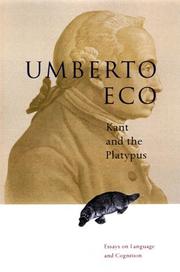Check nearby libraries
Buy this book

"In these essays, Umberto Eco explores in depth such subjects as perception, the relationship between language and experience, and iconism that he only touched on in A Theory of Semiotics. Forgoing a formal, systematic treatment, Eco engages in a series of explorations based on common sense, from which flow an abundance of illustrative fables, often with animals as protagonists.
Among the characters, a position of prominence is reserved for the platypus, which appears to have been created specifically to "put the cat among the pigeons" as far as many theories of knowledge are concerned."--BOOK JACKET.
Check nearby libraries
Buy this book

Previews available in: Portuguese English
Subjects
Semiotics, Erkenntnistheorie, Mentalismus, Sprachphilosophie, Semiotik, Cognition, Kant, immanuel, 1724-1804, Language and languages, philosophy, Perception, Sémiotique, Contribution à la sémiotique, Perception (philosophie), Perception (Philosophy), Philosophy, Linguistics, Categorization (Linguistics), SemanticsShowing 2 featured editions. View all 17 editions?
| Edition | Availability |
|---|---|
|
1
Kant et l'Ornithorynque
March 1, 2001, Livre de poche
Mass Market Paperback
in Portuguese
- 1 edition
2253150266 9782253150268
|
cccc
|
|
2
Kant and the platypus: essays on language and cognition
2000, Harcourt Brace
in English
- 1st ed.
0151004471 9780151004478
|
aaaa
|
Book Details
Edition Notes
Includes bibliographical references (p. 433-452) and index.
Classifications
External Links
The Physical Object
ID Numbers
Source records
Internet Archive item recordmarc_openlibraries_sanfranciscopubliclibrary MARC record
Marygrove College MARC record
Marygrove College MARC record
Internet Archive item record
Library of Congress MARC record
Internet Archive item record
Better World Books record
marc_scms MARC record
marc_columbia MARC record
First Sentence
"The history of research into the philosophy of language is full of men (who are rational and mortal animals), bachelors (who are unmarried adult males), and tigers (though it is not clear whether we should define them as feline mammals or big cats with a yellow coat and black stripes)."
Work Description
"The history of research into the philosophy of language is full of men (who are rational and mortal animals), bachelors (who are unmarried adult males), and tigers (though it is not clear whether we should define them as feline mammals or big cats with a yellow coat and black stripes)."
Community Reviews (0)
History
- Created April 1, 2008
- 18 revisions
Wikipedia citation
×CloseCopy and paste this code into your Wikipedia page. Need help?
| July 17, 2024 | Edited by MARC Bot | import existing book |
| November 11, 2022 | Edited by MARC Bot | import existing book |
| February 26, 2022 | Edited by ImportBot | import existing book |
| August 16, 2021 | Edited by MARC Bot | import existing book |
| April 1, 2008 | Created by an anonymous user | Imported from Scriblio MARC record |











